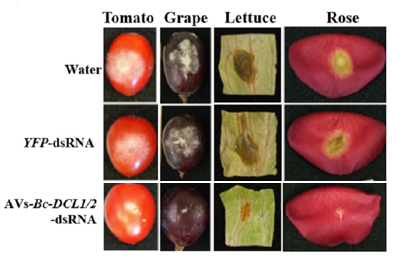Novel Artificial Vesicle Formulation to Deliver Anti-Fungal Gene Targeting RNAs for Crop Protection
Background
Fungal pathogens are a threat to global food security and can cause crop yield losses of up to 20% along with additional post harvest product losses of up to 10%. Currently, resistant strains of fungi to every major fungicide used in agriculture have been identified. In order to continue to safeguard global food security, novel strategies for combating fungal pathogens must be developed. Recent advances to reduce crop yield and product loss include Spray-Induced Gene silencing (SIGS), where antifungal RNAs are applied to plant material through spray application.
Brief Description
Prof. Hailing Jin and colleagues from the University of California, Riverside have developed novel vesicle formulations to deliver antifungal siRNA as a spray so that crop damage and crop loss is minimized. These vesicle/siRNA formulations are used in Spray-Induced Gene silencing (SIGS) approaches to protect crops and post-harvest plant material from fungal pathogens and other pests. This new formulation is an eco-friendly, effective, and cost-efficient alternative to traditional pesticides, and offers a way to target specific pathogen genes without the need for generating a GMO crop.

Fig 1: External spray application of UCR SIGs (AVs-Bc-DCL1/2-dsRNA) inhibited B. cinerea virulence on tomato fruits, grape berries, lettuce leaves and rose petals compared to the water and control (YFP-dsRNA) (non-specific target sequence) treatments.
Application
To protect crops and post-harvest plant material from fungal pathogens and other pests.
Patent Status
| Country | Type | Number | Dated | Case |
| United States Of America | Published Application | 20240268396 | 08/15/2024 | 2021-843 |
Contact
- Rekha Chawla
- rekha.chawla@ucr.edu
- tel: View Phone Number.
Other Information
Keywords
fungicides, RNAi, crop yield, spray, vesicle
